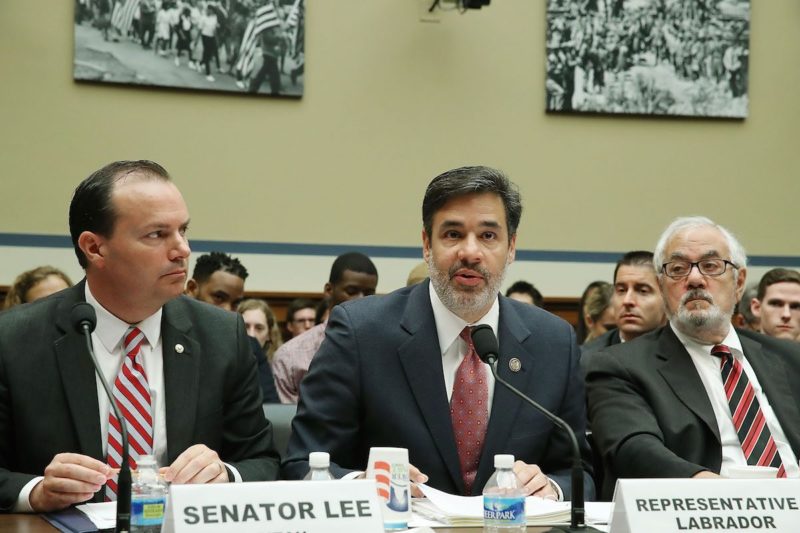GOP Pushes LGBTQ Discrimination on Pulse Shooting Anniversary
A business or other organization drawing on taxpayer money and acting on those views, for instance, could deny child care, health care, and retirement benefits to an employee with a same-sex spouse without penalty from the federal government.

On the one-month anniversary of the massacre at the Pulse nightclub in Orlando, Florida, congressional Republicans pushed legislation that would shield individuals and groups that receive federal funds from penalties for discriminating against LGBTQ people.
A U.S. House of Representatives committee Tuesday debated the First Amendment Defense Act (FADA). Republicans have proposed multiple official and unofficial versions of FADA. All of them share a common purpose: Protect recipients of federal dollars that act on their “religious belief or moral conviction” against same-sex marriage or sex outside of marriage. Conservative groups such as the Heritage Foundation have praised FADA for building on broader Religious Freedom Restoration Act (RFRA) and other so-called religious liberty bills. (The legal website Justia breaks down the similarities and differences between RFRA and FADA.)
A business or other organization drawing on taxpayer money and acting on those views, for instance, could deny child care, health care, and retirement benefits to an employee with a same-sex spouse without penalty from the federal government, Democratic lawmakers opposing the bill said at the House Oversight and Government Reform Committee hearing. Employers could even refuse to provide time off under the Family and Medical Leave Act to care for an ill same-sex spouse.
That possibility troubled Jim Obergefell, the plaintiff in the landmark U.S. Supreme Court ruling on marriage equality. “This is not the kind of dignity and respect that the Supreme Court spoke so eloquently of in the decision granting the freedom to marry nationwide last June,” Obergefell told lawmakers.
If enacted into law, FADA would also empower those with religious objections to be able to turn away LGBTQ people seeking services such as housing or medical care, experts testified before the committee.
Rep. Elijah Cummings (D-MD), the committee’s ranking member, fellow Democrats, and 80 civil rights and other groups petitioned Republicans to reschedule the FADA hearing, to no avail. More than 3,000 faith and clergy last year leaders voiced their opposition to FADA, he said.
“To say that this hearing is ill-timed is the understatement of the year,” Cummings said as he opened the hearing. That evening, House Democrats and the Congressional LGBT Equality Caucus gathered on the capitol steps for a vigil honoring the 49 victims of the Pulse shooting.
Rep. Raúl Labrador (R-IN) introduced the House’s bill (H.R. 2802), and Sen. Mike Lee (R-UT), the identical Senate counterpart (S. 1598). FADA has little to no chance of becoming law this year given President Barack Obama’s increasingly outspoken support for the LGBTQ community, indicating that he would veto any such legislation that somehow managed to advance in the House and Senate. A Mississippi judge recently blocked a similar state law from taking effect.
House Democratic aides provided Rewire with a revised FADA draft that they said Labrador has been circulating since last Friday that goes even further.
Lawmakers and witnesses at the hearing discussed the revised draft, which they said would apply to all businesses—both for-profit and nonprofit. This draft permits discrimination against same-sex and opposite-sex couples except by federal employees acting in the scope of their employment and for-profit federal contractors acting in the scope of a government contract, they added.
David Stacy, the government affairs director for the Human Rights Campaign, the prominent LGBTQ civil rights group, described these exemptions, and others for hospital visitations and medical decisions, as concessions that don’t mask FADA’s underlying discrimination.
“That all being said, the bill has really significant problems that remain,” he said in an interview.
Columbia School of Law professor Katherine Franke underscored that FADA would go beyond permitting discrimination against LGBTQ individuals and include unmarried parents and heterosexual couples.
“A broad reading of this bill would create a safe harbor from penalties associated with an enormous range of behavior that is otherwise illegal or prohibited by federal law and regulation,” Franke said in her testimony before the committee.
Under FADA, she said, the federal government could not deny Title X funding to a health-care clinic that provides family planning services only to patients that can furnish a marriage license. Nor could the government deny a Violence Against Women Act grant to a domestic violence shelter that required residents to pledge their opposition to marriage equality or extramarital relations, she added.
Schools that accept federal funds could fire teachers suspected of having premarital sex, the Huffington Post reported. NARAL Pro-Choice America highlighted the “legislation that lets your boss fire you for having premarital sex (yes, really)” in a scathing memo sent to reporters.
“Are you a single mother whose landlord doesn’t believe in sex outside of marriage? Under this law, your landlord could refuse to house you,” the memo said. “Do you work at a company where your boss doesn’t believe in premarital sex? Under this law, if your boss found out about your private life, they could fire you.”
